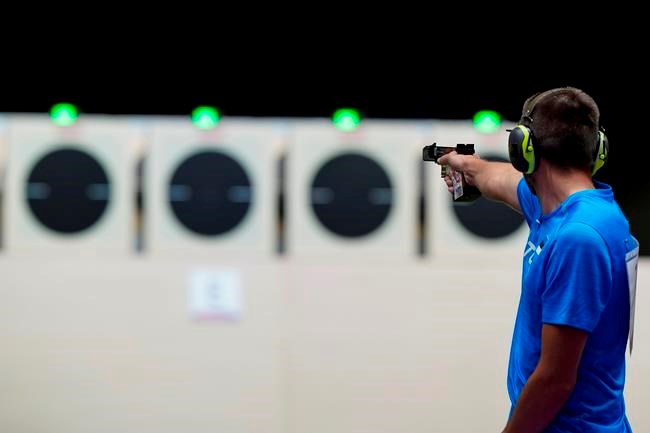OTTAWA — MPs are coming under pressure to broaden an exemption to a planned federal handgun freeze to include a wider range of sport shooters — an idea prominent firearm-control advocates firmly oppose.
In May, the Liberal government announced a plan to implement a freeze on importing, buying, selling or otherwise transferring handguns, in order to help quell firearm-related violence.
The government says effectively capping the number of handguns in Canada will make people safer, noting they were the most serious weapon present in most firearm-related violent crimes between 2009 and 2020.
Businesses could still sell to exempted individuals, including elite sport shooters who compete or coach in handgun events recognized by the international Olympic or Paralympic committees.
Wes Winkel, president of the Canadian Sporting Arms and Ammunition Association, told the House of Commons public safety committee Tuesday that other competition shooters should be exempted from the proposed legislative provisions.
There is no need to single out trained shooters who have "dedicated their lives" to a sport, simply because some handguns are used by criminals, said Winkel, whose group is a voice of the hunting and sport shooting industry.
Winkel suggested adding exemptions for participants in international competitions organized by the Single Action Shooting Society, the International Practical Shooting Confederation and the International Defensive Pistol Association.
Unlike more traditional competitions, IPSC matches can involve firing on the move at stationary and mobile targets, and trying to be quick between shots, when reloading or drawing from a holster.
Jim Smith of IPSC Canada recently posted a statement saying the organization's letter-writing campaign "seems to be getting some traction and I have had a couple of meetings with members of the committee for public safety."¬Ý
"There does seem to be at least an openness to consider adding IPSC to the list of elite shooters who would be exempt from the proposed ban."
Gun-control group PolySeSouvient says in a written brief to the MPs studying the bill, known as C-21, that the exemption should be limited to athletes that compete, train or coach in an Olympic or Paralympic discipline involving handguns.
"In addition, (the committee) should legislate with the possibility in mind that the International Practical Shooting Confederation could one day achieve recognition by the International Olympic Committee," the brief says.
"Amending Bill C-21 to limit the exemption to current Olympic or Paralympics competitions would prevent a future scenario which would render the freeze on new handguns meaningless."
Tony Bernardo, executive director of the Canadian Shooting Sports Association, told the committee Tuesday the bill doesn't recognize that those who train to become elite shooters usually start as young as eight or nine.
"A championship shooter is like an NHL hockey player, they don't just fall off the tree. They require decades of training to get to where they have to be — hundreds of thousands of rounds of ammunition to be able to get that good. It's a very difficult sport."
PolySeSouvient argues the bill's current wording would allow anyone claiming to be interested in one day competing in a handgun-shooting Olympic discipline to be exempted and accepted in a beginner course.
The group therefore seeks an amendment limiting the exemption to current athletes and coaches in an Olympic or Paralympic discipline, instead of what it sees as a blanket exemption for any and all future beginners.
This report by The Canadian Press was first published Oct. 18, 2022.
Jim Bronskill, The Canadian Press




